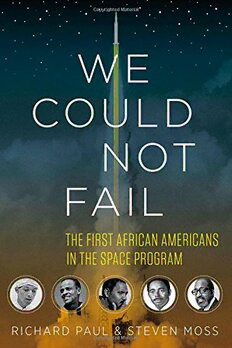
We Could Not Fail: The First African Americans in the Space Program PDF
Preview We Could Not Fail: The First African Americans in the Space Program
We Could Not Fail THIS PAGE INTENTIONALLY LEFT BLANK We Could Not Fail The First African Americans in the Space Program Richard Paul � Steven Moss University of Texas Press Austin Copyright © 2015 by Richard Paul and Steven Moss All rights reserved Printed in the United States of America First edition, 2015 Requests for permission to reproduce material from this work should be sent to: Permissions University of Texas Press P.O. Box 7819 Austin, TX 78713- 7819 http://utpress.utexas.edu/index.php/rp- form ♾ The paper used in this book meets the minimum requirements of ANSI/NISO Z39.48- 1992 (R1997) (Permanence of Paper). Library of Congress Cataloging- in- Publication Data Paul, Richard, 1959– We could not fail : the first African Americans in the space program / by Richard Paul and Steven Moss. — First edition. pages cm Includes bibliographical references and index. ISBN 978- 0- 292- 77249- 6 (cloth : alk. paper) 1. United States. National Aeronautics and Space Administration—Officials and employees—Biography 2. African American professional employees—Biography. 3. African American engineers—Biography. 4. African American astronauts— Biography. 5. United States. National Aeronautics and Space Administration— Officials and employees—History. 6. United States. National Aeronautics and Space Administration—Rules and practice—History. 7. Discrimination in employment—United States—History—20th century. 8. Race discrimination— United States—History—20th century. I. Moss, Steven, 1962– II. Title. III. Title: First African Americans in the Space Program. TL521.312.P39 2015 629.4092′396073—dc23 2014030513 doi:10.7560/772496 For Renee —R ichard Paul With love to Lewis M., June, and Susan Moss —S teven Moss THIS PAGE INTENTIONALLY LEFT BLANK Contents Preface ix Introduction 1 1. A Man of Firsts: Julius Montgomery 12 2. “There Was a Lot of History There”: Theodis Ray 32 3. Stronger Than Steel: Frank Crossley 50 4. Dixie’s Role in the Space Age 68 5. First of Race in Space: Ed Dwight 89 6. The View from Space: George Carruthers 105 7. “Huntsville, It Has Always Been Unique”: Delano Hyder and Richard Hall 123 8. The Country Spartacus: Clyde Foster 151 9. Water Walkers: Morgan Watson and George Bourda 188 Conclusion 221 Appendix: Relevant Census Numbers on Employed Professional and Skilled Labor for NASA Host States 241 Notes 247 Acknowledgments 283 Index 287 THIS PAGE INTENTIONALLY LEFT BLANK Preface In 2008, the alumni office at Southern University– Baton Rouge helped us find Frank Williams, one of the first six black engi- neers at the National Aeronautics and Space Administration (NASA). We contacted him at his home in New Orleans and asked if he would sit for an interview. “Yeah, sure,” he said, though he quickly added, “But you should talk to my daughter,” and handed her the phone. Tarsia Williams was suspicious. “What’s this about?” she asked. We ex- plained that we were producing a documentary and that her father was important to its story. There had been an article in the New York Times in 1964 that called him “a social pioneer.” He was one of the first African American engineers at NASA. She was aghast. “He was what?” She never knew there was an article in the New York Times. She never knew he was one of the first black engineers at NASA. She knew none of this. Now she was excited, but she was still concerned. “My father is very sick,” she said. Still, we arranged to conduct the interview, hiring a public radio producer in New Orleans to record Mr. Williams’s half of the conversation. When the day of the interview arrived, things did not go well. We asked the first question and all Frank Williams could do was cough— a long painful spasm of coughing that went on for nearly half a minute. A second attempt was no better, or a third. After about five minutes, Tarsia came back on the line. She was in tears. “I’m so sorry,” she said. “I told you my father is very sick. He has mesothelioma, and I don’t think you’re going to be able to get him to do anything but this. And I’m so sad,” she continued. “This was going to be my chance to hear all these stories. I’m sorry,” she said. The interview was over.
